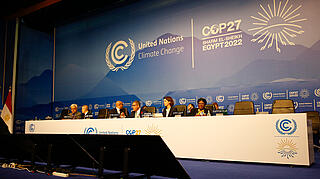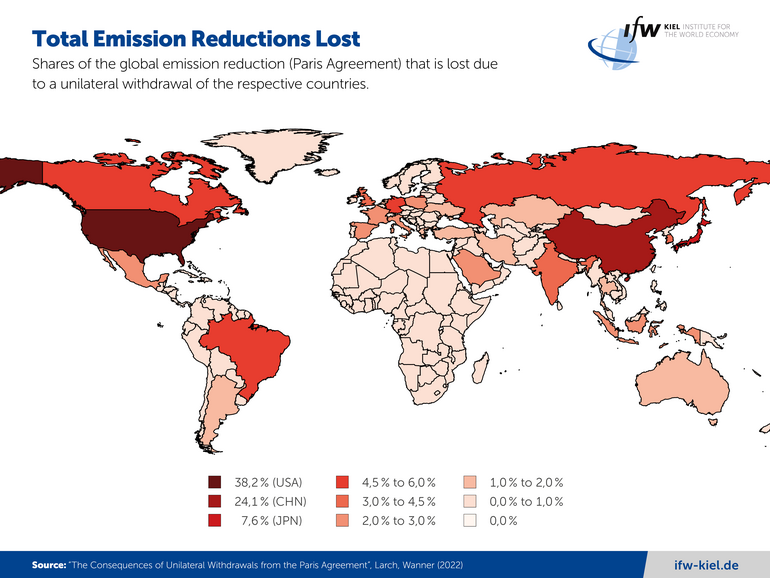News
Paris Agreement: Unilateral Withdrawal by the U.S. and China Can Do the Most Damage

The global coverage of the Paris Climate Agreement, agreed seven years ago at COP21, is seen as a crucial step forward from its most prominent predecessor, the Kyoto Protocol.
If all 195 countries keep their pledges for national reduction targets under the Paris Climate Agreement, global carbon emissions fall by an estimated 25.4 percent compared to a business-as-usual emissions pathway, according to the authors, whose calculations have just been published as a Kiel Working Paper titled ”The Consequences of Unilateral Withdrawals from the Paris Agreement.” If individual countries withdraw, this share is reduced. By how much depends on the respective emission levels as well as on the respective national emission reduction targets.
”The worst impact would be a unilateral U.S. withdrawal from the Paris Climate Agreement,” says Joschka Wanner, a member of the Trade Policy Research Center at the Kiel Institute and one of the authors. There are two reasons for this, he says: ”The U.S. is the world's second largest emitter. But they have also committed to a high reduction in their emissions with a targeted 47 percent reduction.” Instead of a 25.4 percent reduction, the world would reduce its emissions by only 17.3 percent in this scenario, he said. So, the targeted global reduction would be reduced by nearly 32 percent. The second largest immediate impact on global emissions from foregone reduction pledges would come from a Chinese exit, which would reduce global reductions by 11.9 percent. China emits even more Carbon than the U.S., but also has a much lower reduction target (minus 11.3 percent).
The damage of a unilateral withdrawal is not limited to the direct effect, however. ”Individual countries that withdraw from the Paris climate agreement have an incentive to actually increase their emissions,” Wanner said. First, the withdrawing country would gain a competitive advantage in emissions-intensive sectors. Second, global climate policy efforts would reduce demand for fossil fuels, which in turn lowers their price.
This is known as carbon leakage and is of considerable importance. Model simulations using an adjusted model borrowed from the trade literature for 140 countries show that U.S. emissions, for example, would increase by 9.5 percent if ”Paris” were to be abandoned. ”That increase could wipe out almost a tenth of the reduction achieved by the rest of the world,” Wanner says, illustrating the dimensions. So, combining the direct effect with the indirect leakage effect, a U.S. exit from the Paris Agreement, reduces the global emissions reduction amount by 38.2 percent. In the case of China, the indirect leakage effect is even stronger. China's emissions would increase by 14 percent, resulting in a total reduction loss of 24.1 percent in terms of global emissions.

In addition to the two climate policy heavyweights, the U.S. and China, several European countries (Germany, Italy, France, and the United Kingdom), other large industrialized countries (Japan, Canada, and South Korea), and three of the four remaining BRICS countries (Brazil, Russia, and India) also have the potential to noticeably reduce the overall reduction (all in the range of 2.9 to 7.6 percent).
The European Union takes a special role in the Paris Agreement as all of its member countries are parties to the agreement individually, but at the same time the EU is a party on its own to the treaty. Therefore, even though a potential EU withdrawal would imply that a group of countries would drop out of the agreement, it can still be considered as a form of unilateral withdrawal. This would result in a total reduction loss of 23.1 percent, a similar magnitude to China. However, in the case of the EU, the direct reduction loss is very high (18.5 percent) and the indirect leakage effect is rather small (5.6 percent), exactly the opposite of the Chinese scenario. While these figures underline the importance of the EU as a major player in multilateral climate policy, they also show that its importance stems primarily from its potential to play a pioneering role in particularly ambitious reduction targets.
Complementing this, the authors took another detailed look at the increase in emissions caused by carbon leakage and find that it can be attributed mainly to a shift toward emissions-intensive production technologies in response to lower international fossil fuel prices. ”The energy market plays a big role in the leakage effect,” Wanner says. ”This suggests that climate policy should also look at the supply of, not just the demand for, fossil fuels, especially when global cooperation threatens to fail.”
The withdrawal scenarios considered here are hypothetical for the time being, since the official commitment to the Paris Climate Agreement is very high. However, at least for the direct effects, the calculations also show how large the impact on global emission reductions is if individual countries do not meet their national targets—even without this being explicitly formulated as a withdrawal.
